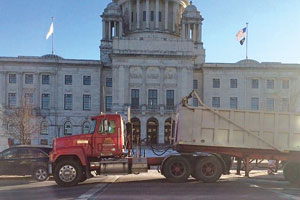Relief Plan Offered for R.I. In-State Commercial Truck Owners

With the national trucking industry threatening to challenge the constitutionality of the truck tolls in court, after the first gantry goes up, House Speaker Nicholas Mattiello was insistent on June 9 that the registration-fee cuts in the newly unveiled budget bill have nothing to do with the tolls.
"I don't want to connect the two,'' Mattiello said.
But "if it's a Rhode Island company with a Rhode Island registration, they are going to benefit from this new plan which cuts their registrations in half. If they are registered out of state, they won't receive that benefit,'' he told The Journal, moments before a public briefing on the budget bill got under way.
The two-part relief package surfaced for the first time when the House Finance Committee began voting, shortly after midnight on June 8, on a reworked version of the $8.9-billion state budget Raimondo proposed in February for the new fiscal year that begins July 1.
The budget bill, now headed to the full House for a vote June 14, would reduce in varying amounts — depending on weight — the annual registration fees paid by commercial rigs, weighing at least 10,000 pounds, starting July 1, 2017.
At the lowest end, the annual registration fee would drop from $106 to $78. For trucks weighing more than 74,000 pounds — which are at the top end now — the fee would drop from $972 (plus $24 for every additional two pounds in weight) to $510. For even larger rigs, there would be a graduated fee schedule, topping off at $690 for tractor-trailer trucks weighing more than 104,000 pounds (plus $12 for every additional 2,000 pounds of weight).
Mattiello pegged the potential cost of the benefit to the state at $4.2 million, though it remains unclear how many Rhode Island-based truckers — with interstate routes — who currently register out-of-state might do the math and decide to register here instead.
Mattiello said there is also a $2 million "clean diesel" fund.
He elaborated: "We try to assist all of our economic sectors and industries, and trucking is a very important industry to us and we're trying to help them reduce costs ... so what we've done is we've reduced the fees roughly in half ... and we've provided a clean diesel program that will help them replace emissions equipment and filters and [do] regular maintenance on their engines so the trucks are environmentally more friendly.''
The action was not a total surprise. Before they authorized a statewide network of truck tolls earlier this year, Rhode Island lawmakers told the local trucking industry that a financial relief package would follow.
But it remained unclear how they intended to help the truckers since a $13.5 million tax credit package for the industry was cut from an earlier version of Raimondo’s truck-toll legislation. The reason: concern about the legality of favoring local businesses over out-of-state competitors, should the Rhode Island Trucking Association make good on its pledge to challenge the tolls in court.
Asked in January how he would construct a local industry relief package that didn't run afoul of interstate commerce protections, Mattiello said: "Carefully.''
On June 8, Chris Maxwell, president of the Rhode Island Trucking Association, said he was surprised to hear of the proposed cut in truck registration fees passed by House lawmakers June 7, and at that point had no details.
“If they’re trying to help the truck industry, great,” Maxwell said. "But it’s a long way from undoing the damage the tolling would do. It looks to me more like a token gesture.”
“Any savings that can help offset the impact of the toll would be a good thing,” added David Sarlitto, executive director of Ocean State Job Lot, headquartered in North Kingstown. “It certainly makes it a little easier to do business in the state.”
With reports from Tom Mooney

